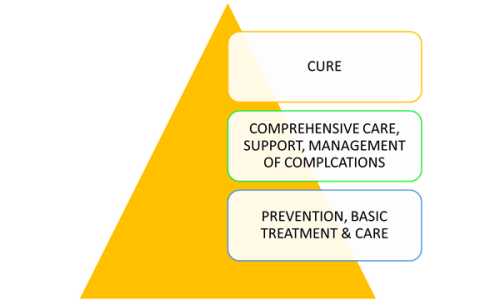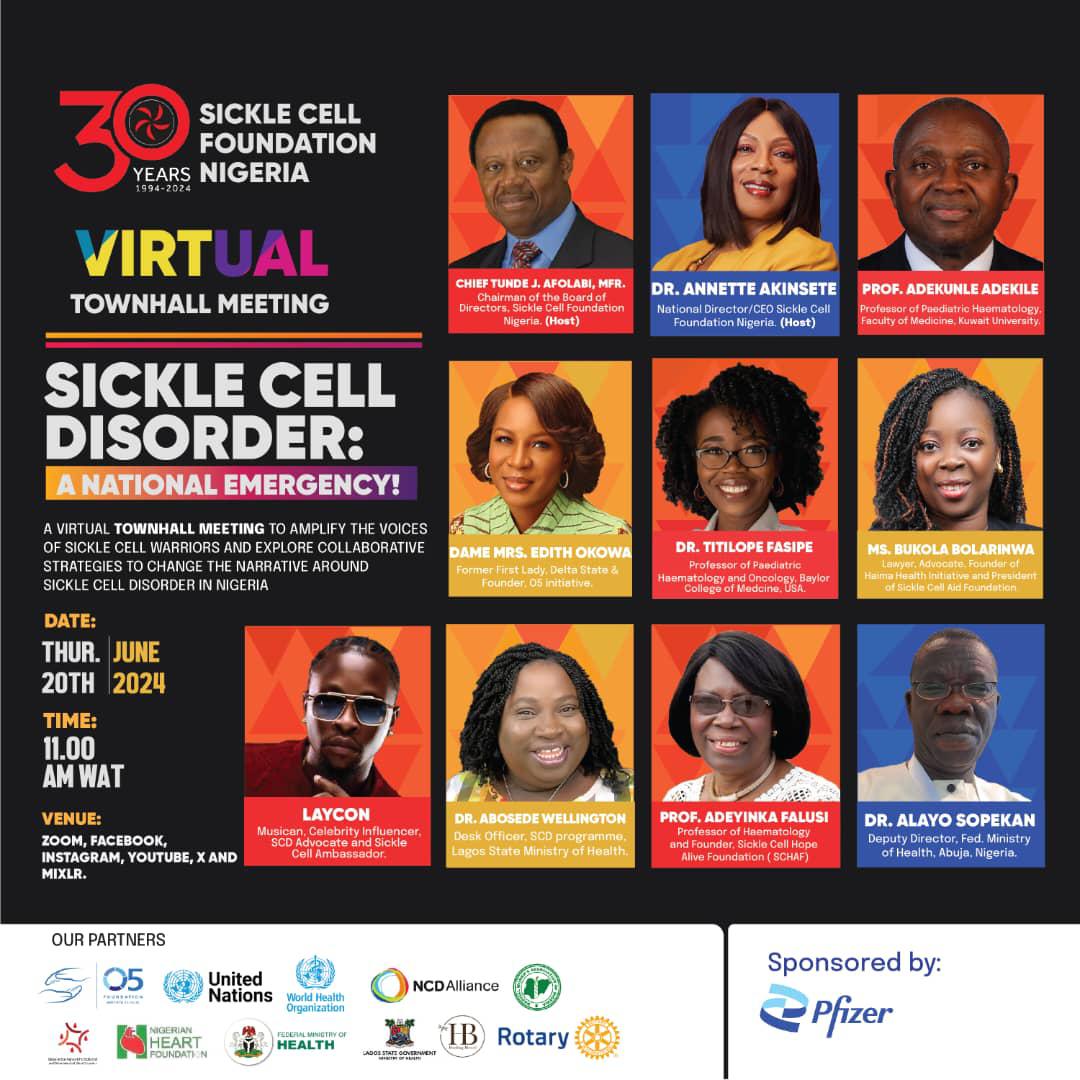THEME: SICKLE CELL DISORDER – A NATIONAL EMERGENCY!
BACKGROUND
Sickle Cell Disorder (SCD) is the most common inherited blood disorder in the world. It is associated with severe shortage of blood, severe pain, serious complications such as stroke in children, chronic leg ulcers, degeneration of the hip joint, multiple organ failure, as well as social stigma, emotional and mental trauma and untimely death. Sickle Cell disorder (SCD) affects nearly 100 million people in the world. Of the 300,000 children born annually worldwide with SCD, more than 70% are in Sub-Saharan Africa – the vast majority in Nigeria.
Nigeria is the country with the highest burden of sickle cell disorder in the world!: In Nigeria, SCD is among the 10 priority non-communicable diseases (NCDs) and it contributes significantly to both child and adult morbidity and mortality.
By virtue of its population, Nigeria stands out as the most sickle cell-endemic country in the world; an estimated 150,000 babies are born every year in Nigeria with SCD and sadly, 50 – 90% do not live to celebrate their 5th birthday, mostly due to ignorance and lack of access to appropriate diagnosis and care.
It is also estimated that over 25% of Nigerians have the sickle cell trait, implying that more than 40 million Nigerians are healthy carriers of the sickle cell gene (Hb AS) – about a quarter of the entire nation’s population – and can therefore transfer the gene to their offspring.
Life Expectancy: The average life expectancy of persons with sickle cell in Nigeria remains very low – less than 20 years; whereas in the US for instance, it is now over 60 years.
These grim statistics are predicted to worsen, should sickle cell disorder not be addressed as the serious public health problem that it is. It is indeed high time SCD is indeed seen as a NATIONAL HEALTH EMERGENCY WHICH MUST BE HANDLED WITH A HIGH SENSE OF URGENCY. Unfortunately, SCD continues to be of low priority for government and critical stakeholders, who should work in a coherent manner in order to bring SCD to heel.
Sickle Cell Foundation Nigeria posits that we need a targeted approach to addressing the sickle cell problem.
High mortality due to SCD in children under 5 years has been virtually eliminated from North America through policies and legislation that ensure ready access to a number of simple interventions, including newborn screening and prevention of infection through the provision of penicillin prophylaxis and polyvalent pneumococcal vaccination.
We can get there as a country!
The 63rd session of the UN General Assembly in December 2008 adopted a resolution on “recognition of sickle-cell anemia as a public health problem,” and urged Member States and UN organisations to raise awareness of SCD on June 19 of each year. Despite the fact that the UN has called for global efforts “to bring the disease out of the shadows,” relatively little attention has been given to assessing the burden of SCD and how to reduce it in sub-saharan Africa, where about 85% of children with SCD are born.
In 2010, the WHO Regional Office for Africa proposed a SCD strategy officially recognising SCD as an important cause of child mortality in many African countries. Enough is already known to justify investment in public health SCD programmes, such as those already in place for other conditions (e.g., HIV or malaria), for promoting widespread screening, health education, and treatment to prevent or manage SCD.
The Sickle Cell Pyramid of Care Ensures that everyone can play a role in bringing adequate intervention to the eco-system. No measure of support is too small to move the needle towards improved narratives.
SCD PYRAMID OF CARE

Prevention, Basic Treatment, Comprehensive Care, Support, Management of Complications: These are at the base and mid-section of the pyramid; interventions that focus on reduction in incidence of the SCD as well as provide the most care for the most people with the disorder, ensuring that persons with SCD can adequately manage the condition and live pain-free and fulfilling lives
Government and other Stakeholders should invest resources and efforts in advocacy, awareness, education, genetic counselling, newborn screening, research-oriented projects and programmes that can bridge the knowledge gap that exists.
Cure: The cure for SCD is at the apex of the pyramid. Whilst it behoves Nigeria as the sickle cell capital of the world to have centres that have centres that offer cure solutions for SCD (such as Stem Cell Transplantation), not everyone with SCD is a good candidate for these interventions and not everyone can afford them – with a huge percentage of the SCD demographic living below the poverty line and struggling to access basic routine medications.
Applying resources to the Prevention, Basic Treatment, Comprehensive Care, Support, Management of Complications bands of the Care Pyramid will go a long way in alleviating the burden of sickle cell disorder in Nigeria.
Without intensifying Education and Awareness, Nigeria will continue to bear the huge burden of SCD with high morbidity and mortality – with huge socio-economic implications for the country. More than ever before, there is a need to deploy a collaborative, coherent and synergistic approach to bringing the necessary intervention for this marginalized demographic of persons with SCD. Working in silos will not produce the expected results we are looking for.
Synergy is the new energy required to get the job done. Avoiding confronting the challenge or ignoring it will not solve the problem. Government, corporate bodies, religious institutions, individuals, the medical community and all other relevant stakeholders must give impetus to initiate the deployment of relevant resources and interventions for persons with SCD.
SCD and the SDGs: Addressing SCD presents Nigeria with a low-hanging fruit opportunity for achieving SDG 3/Target 2 – Reducing Under 5 mortality (approximately 10% of children born in Nigeria die before reaching the age of five – a statistic that we can deal a blow with interventions targeted at SCD). This will take strong political will and intentionally prioritising SCD as a public health problem, but will certainly mark a huge win for us all!
THE TOWN HALL MEETING
Sickle Cell Foundation Nigeria is the foremost Sickle Cell NGO in Nigeria that covers ALL aspects of sickle cell programming – from advocacy, genetic counselling, prevention, treatment, care and support, to providing cure for sickle cell, capacity building and research. The Foundation has championed the cause of sickle cell disorder in the past 30 years – mobilising stakeholders – including government – to coherently and effectively address sickle cell disorder as a major public health problem in the country. Given that the control of Sickle cell disorder in Nigeria today remains sub-optimal and fragmented, Sickle Cell Foundation Nigeria is positioned to bring stakeholders together to confront the challenge and draw out solutions around effective partnerships and collaborations and identify means of fast-tracking reduction of the burden of the disorder in Nigeria.
Mindful of the foregoing, the 2024 World Sickle Cell Day Flagship event will be in the format of a VIRTUAL TOWNHALL MEETING, with the theme: “SICKLE CELL DISORDER: A NATIONAL EMERGENCY!”- a very apt theme for a country such as ours, with the highest burden of SCD in the world, requiring URGENT, CONCERTED ACTION
GOAL & OBJECTIVES OF TOWN HALL MEETING
The Goal of this Virtual Town Hall Meeting is to commemorate the 2024 World Sickle Cell Day (WSCD), as designated by the United Nations, by powerfully advocating for the sickle cell disorder cause – with affected persons front and centre – raising awareness and educating about the condition locally and globally and drawing national and global attention to it in order to ensure that coherent strategies are put in place for its control.
To stimulate discussions that will spark the required collaborations and partnerships that will fast-track reduction of the burden of sickle disorder in Nigeria and across the globe.
To present a platform to persons with SCD and their families to share their concerns around SCD
To educate persons living with sickle cell disorder, their families and the general public about SCD by stimulating discussions about various aspects and providing answers to questions, queries and inquiries
To educate the media about SCD, equipping them with key information to share with the public
To ensure quality feedback from affected persons and the public to healthcare workers, government and others – with a view to improving knowledge and quality of care
FORMAT OF TOWNHALL MEETING:
Virtual: The town Hall Meeting will be VIRTUAL, therefore allowing participation from across the country and beyond. Stakeholders will be brought together – including persons with sickle cell disorder and their families and friends, support groups, Advocates, government, the private sector, religious organisations, schools, health workers, the media, influencers, concerned Nigerians and the general public.
The meeting will be interactive and the outcomes of the deliberation will help shape policy formulation and the birthing of initiatives and interventions targeted at reducing the burden of sickle cell in Nigeria.
The Townhall will be a platform to infuse a surge of hope to the Sickle Cell Community through testimonials shared by affected persons who have overcome challenges and excelled in their various walks of life – speaking to “THE POSSIBLE LIFE” of those “DEFYING THE ODDS TO BECOME”.
The Moderator will field:
Livestreaming: The Virtual Townhall meeting will be streamed simultaneously on major Social Media
Platforms – Facebook, Instagram, Youtube, X and Mixlr, with the objective of reaching over a thousand people.
Chairman of Occasion: The Chairman of the occasion will be the erudite, world-renowned Professor of Haematology – Professor Adekunle Adekile.
Moderator: Dr. Titilope Fadipe: Assistant Professor of Pediatric Hematology and Oncology at Baylor College of Medicine and is the Co-Director of the Sickle Cell and Thalassemia Program at the Texas Children’s Hospital, USA
Panelists: The Panelists at the Townhall will be as follows:
- Dr. Alayo Sopekan – Deputy Director, Fed. Ministry of Health, Nigeria
- Dr. Abosede Wellington: Desk Officer, SCD Programme, Lagos State Ministry of Health
- ADEKUNLE GOLD: Person living with SCD, Musician, Philanthropist, Sickle Cell Advocate & Champion
- LAYCON – Person living with SCD, Musician, Celebrity influencer, Sickle Cell Ambassador
- Professor Adeyinka Falusi – Professor of haematology and Founder, Sickle Cell Hope Alive Foundation (SCHAF)
- Mrs. Bukola Bolarinwa: Person living with Sickle Cell, Lawyer, Advocate, President, Sickle Cell Aid Foundation (SCAF) and founder of Haima Health Initiative.
- Dr. Annette Akinsete: Consultant Public Health Physician & National Director/CEO Sickle Cell Foundation Nigeria
The Audience:
The audience will comprise persons with SCD in Nigeria and around the world. There will also be their families & friends, Advocacy & support groups, government – at national and sub-national levels, the private sector, healthcare workers – doctors, nurses, pharmacists, social workers, the diplomatic community, other stakeholders.
EXPECTED OUTPUT
Communique on Key Issues and RECOMMENDATIONS from SCFN’s 2024 World Sickle Cell Day Townhall meeting on the theme: “SICKLE CELL DISORDER: A NATIONAL EMERGENCY!”
EXPECTED OUTCOMES
- A spark and initiation platform for relevant partnerships and collaborations to aggressively pursue the deployment of sustainable interventions for SCD related issues in Nigeria and the globe.
- Increased public awareness raised about sickle cell disorder
- Improved knowledge of policy makers and health workers about perception of the sickle cell community and the general public about sickle cell disorder
- Persons living with sickle cell and their families will be positively impacted with better knowledge of the disorder and its management, as well as enhanced self-image and self-esteem.
I welcome you to an exploratory, expository and re-awakening session.



